Saturday, May 31, 2025. Annette’s Roundup for Democracy.
So, El Trumpo put a drug addict in charge of our country and the world.
Will the press ask him about this?
Also, why don’t you ask your Elected Officials - red and blue - about this?
On the Campaign Trail, Elon Musk Juggled Drugs and Family Drama.
As Mr. Musk entered President Trump’s orbit, his private life grew increasingly tumultuous and his drug use was more intense than previously known.
As Elon Musk became one of Donald J. Trump’s closest allies last year, leading raucous rallies and donating about $275 million to help him win the presidency, he was also using drugs far more intensely than previously known, according to people familiar with his activities.
Mr. Musk’s drug consumption went well beyond occasional use. He told people he was taking so much ketamine, a powerful anesthetic, that it was affecting his bladder, a known effect of chronic use. He took Ecstasy and psychedelic mushrooms. And he traveled with a daily medication box that held about 20 pills, including ones with the markings of the stimulant Adderall, according to a photo of the box and people who have seen it.
It is unclear whether Mr. Musk, 53, was taking drugs when he became a fixture at the White House this year and was handed the power to slash the federal bureaucracy. But he has exhibited erratic behavior, insulting cabinet members, gesturing like a Nazi and garbling his answers in a staged interview.
At the same time, Mr. Musk’s family life has grown increasingly tumultuous as he has negotiated overlapping romantic relationships and private legal battles involving his growing brood of children, according to documents and interviews.
On Wednesday evening, Mr. Musk announced that he was ending his stint with the government, after lamenting how much time he had spent on politics instead of his businesses.
Mr. Musk and his lawyer did not respond to requests for comment this week about his drug use and personal life. He has previously said he was prescribed ketamine for depression, taking it about every two weeks. And he told his biographer, “I really don’t like doing illegal drugs.”
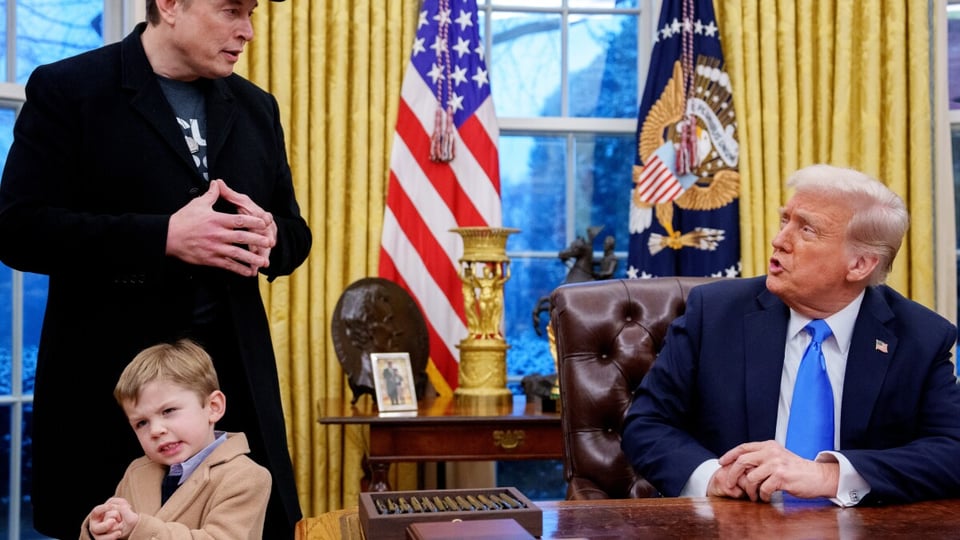
President Trump spoke about government spending alongside Mr. Musk and his son, known as X, in the Oval Office in February.
The White House did not respond to questions about whether it had asked Mr. Musk to take drug tests. As a large government contractor, his aerospace firm, SpaceX, must maintain a drug-free work force and administers random drug tests to its employees. But Mr. Musk has received advance warning of the tests, according to people close to the process. SpaceX did not respond to questions about those warnings.
Mr. Musk, who joined the president’s inner circle after making a vast fortune on cars, satellites and rocket ships, has long been known for grandiose statements and a mercurial personality. Supporters see him as an eccentric genius whose slash-and-burn management style is key to his success.
But last year, as he jumped into the political arena, some people who knew him worried about his frequent drug use, mood swings and fixation on having more children. This account of his behavior is based on private messages obtained by The New York Times as well as interviews with more than a dozen people who have known or worked with him.
This year, some of his longtime friends have renounced him, pointing to some of his public conduct.
“Elon has pushed the boundaries of his bad behavior more and more,” said Philip Low, a neuroscientist and onetime friend of Mr. Musk’s who criticized him for his Nazi-like gesture at a rally.
And some women are challenging Mr. Musk for control of their children.
One of his former partners, Claire Boucher, the musician known as Grimes, has been fighting with Mr. Musk over their 5-year-old son, known as X. Mr. Musk is extremely attached to the boy, taking him to the Oval Office and high-profile gatherings that are broadcast around the world.
Ms. Boucher has privately complained that the appearances violate a custody settlement in which she and Mr. Musk agreed to try to keep their children out of the public eye, according to people familiar with her concerns and the provision, which has not been previously reported. She has told people that she worries about the boy’s safety, and that frequent travel and sleep deprivation are harming his health.
Another mother, the right-leaning writer Ashley St. Clair, revealed in February that she had a secret relationship with Mr. Musk and had given birth to his 14th known child. Mr. Musk offered her a large settlement to keep his paternity concealed, but she refused. He sought a gag order in New York to force Ms. St. Clair to stop speaking publicly, she said in an interview.
A Ketamine Habit
Mr. Musk has described some of his mental health issues in interviews and on social media, saying in one post that he has felt “great highs, terrible lows and unrelenting stress.” He has denounced traditional therapy and antidepressants.
He plays video games for hours on end. He struggles with binge eating, according to people familiar with his habits, and takes weight-loss medication. And he posts day and night on his social media platform, X.
Mr. Musk has a history of recreational drug use, The Wall Street Journal reported last year. Some board members at Tesla, his electric vehicle company, have worried about his use of drugs, including Ambien, a sleep medication.
In an interview in March 2024, the journalist Don Lemon pressed him on his drug use. Mr. Musk said he took only “a small amount” of ketamine, about once every two weeks, as a prescribed treatment for negative moods.
“If you’ve used too much ketamine, you can’t really get work done, and I have a lot of work,” he said.
He had actually developed a far more serious habit, The Times found.
Mr. Musk had been using ketamine often, sometimes daily, and mixing it with other drugs, according to people familiar with his consumption. The line between medical use and recreation was blurry, troubling some people close to him.
He also took Ecstasy and psychedelic mushrooms at private gatherings across the United States and in at least one other country, according to those who attended the events.
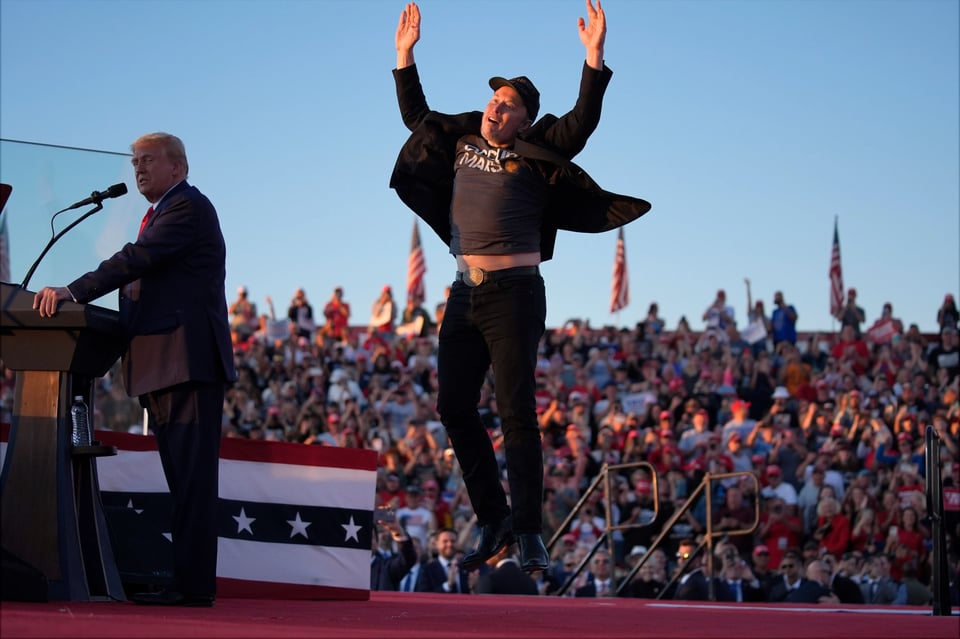
Elon Musk at a Trump rally last year in Butler, Pa.
The Food and Drug Administration has formally approved the use of ketamine only as an anesthetic in medical procedures. Doctors with a special license may prescribe it for psychiatric disorders like depression. But the agency has warned about its risks, which came into sharp relief after the death of the actor Matthew Perry. The drug has psychedelic properties and can cause dissociation from reality. Chronic use can lead to addiction and problems with bladder pain and control.
By the spring of last year, Mr. Musk was ramping up criticism of President Joseph R. Biden Jr., particularly his policies on illegal immigration and diversity initiatives.
Mr. Musk was also facing federal investigations into his businesses. Regulators were looking into crashes of Tesla’s self-driving cars and allegations of racism at its factories, among other complaints.
“There are at least half a dozen initiatives of significance to take me down,” he wrote in a text message to someone close to him last May. “The Biden administration views me as the #2 threat after Trump.”
Around that time, Mr. Musk told people that his ketamine use was causing bladder issues, according to people familiar with the conversations.
On Oct. 5, he appeared with Mr. Trump at a rally for the first time, bouncing up and down around the candidate. That evening, Mr. Musk shared his excitement with a person close to him. “I’m feeling more optimistic after tonight,” he wrote in a text message. “Tomorrow we unleash the anomaly in the matrix.”
“This is not something on the chessboard, so they will be quite surprised,” Mr. Musk added about an hour later. “‘Lasers’ from space.”
After Mr. Trump won, Mr. Musk rented a cottage at Mar-a-Lago, the president-elect’s Florida resort, to assist with the transition. Mr. Musk attended personnel meetings and sat in on phone calls with foreign leaders. And he crafted plans to overhaul the federal government under the new Department of Government Efficiency.
“I can’t be president, but I can help Trump defeat Biden and I will,” he added.
He publicly endorsed Mr. Trump in July.
Family Secrets
Mr. Musk has also been juggling the messy consequences of his efforts to produce more babies.
By 2022, Mr. Musk, who has married and divorced three times, had fathered six children in his first marriage (including one who died in infancy), as well as two with Ms. Boucher. She told people she believed they were in a monogamous relationship and building a family together.
But while a surrogate was pregnant with their third child, Ms. Boucher was furious to discover that Mr. Musk had recently fathered twins with Shivon Zilis, an executive at his brain implant company, Neuralink, according to people familiar with the situation.
Mr. Musk was by then sounding an alarm that the world’s declining birthrates would lead to the end of civilization, publicly encouraging people to have children and donating $10 million to a research initiative on population growth.
Privately, he was spending time with Simone and Malcolm Collins, prominent figures in the emerging pronatalist movement, and urging his wealthy friends to have as many children as possible. He believed the world needed more intelligent people, according to people aware of the conversations.
Mr. Collins declined to comment on his relationship with Mr. Musk, but said, “Elon is one of the people taking this cause seriously.”
Even as Mr. Musk fathered more children, he favored his son X. By the fall of 2022, during a period when he and Ms. Boucher were broken up, he began traveling with the boy for days at a time, often without providing advance notice, according to people familiar with his actions.
Ms. Boucher reconciled with Mr. Musk, only to get another unpleasant surprise. In August 2023, she learned that Ms. Zilis was expecting a third child with Mr. Musk via surrogacy and was pregnant with their fourth.
Ms. Boucher and Mr. Musk began a contentious custody battle, during which Mr. Musk kept X for months. They eventually signed the joint custody agreement that specified keeping their children out of the spotlight.
By mid-2023, unknown to either Ms. Boucher or Ms. Zilis, Mr. Musk had started a romantic relationship with Ms. St. Clair, the writer, who lives in New York City.
Ms. St. Clair said in an interview that at first, Mr. Musk told her he wasn’t dating anyone else. But when she was about six months pregnant, he acknowledged that he was romantically involved with Ms. Zilis, who went on to become a more visible fixture in Mr. Musk’s life.
Ms. St. Clair said that Mr. Musk told her he had fathered children around the world, including one with a Japanese pop star. He said he would be willing to give his sperm to anyone who wanted to have a child.
“He made it seem like it was just his altruism and he generally believed these people should just have children,” Ms. St. Clair said.
Ms. St. Clair said that when she was in a delivery room giving birth in September, Mr. Musk told her over disappearing Signal messages that he wanted to keep his paternity and their relationship quiet.
On election night, Ms. St. Clair and Mr. Musk both went to Mar-a-Lago to celebrate Mr. Trump’s victory. But she had to pretend that she hardly knew him, she said.
He offered her $15 million and $100,000 a month until their son turned 21, in exchange for her silence, according to documents reviewed by The Times and first reported by The Journal. But she did not want her son’s paternity to be hidden.
After she went public in February, ahead of a tabloid story, she sued Mr. Musk to acknowledge paternity and, later, to get emergency child support.
Mr. Musk sought a gag order, claiming that any publicity involving the child, or comments by Ms. St. Clair on her experience, would be a security risk for the boy.
‘No Sympathy for This Behavior’
Some of Mr. Musk’s onetime friends have aired concerns about what they considered toxic public behavior.
In a January newsletter explaining why their friendship had ended, Sam Harris, a public intellectual, wrote that Mr. Musk had used his social media platform to defame people and promote lies.
“There is something seriously wrong with his moral compass, if not his perception of reality,” Dr. Harris wrote.
Later that month, at a Trump inauguration event, Mr. Musk thumped his chest and thrust his hand diagonally upward, resembling a fascist salute. “My heart goes out to you,” he told the crowd. “It is thanks to you that the future of civilization is assured.”
Mr. Musk dismissed the resulting public outcry, saying he had made a “positive gesture.”
Dr. Low, who is chief executive of NeuroVigil, a neurotechnology company, was outraged by the performance. He wrote Mr. Musk a sharp email, shared with The Times, cursing him “for giving the Nazi salute.”
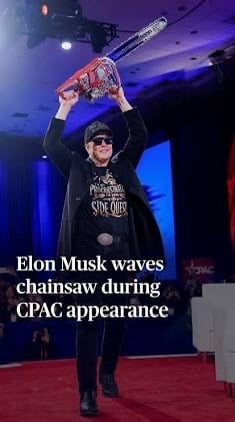
Mr. Musk was given a chain saw by the Argentine president, Javier Milei, at the Conservative Political Action Conference in February.
When Mr. Musk didn’t respond to the message, Dr. Low posted his concerns on social media. “I have no sympathy for this behavior,” he wrote on Facebook, referring to the gesture as well as other behaviors. “At some point, after having repeatedly confronted it in private, I believe the ethical thing to do is to speak out, forcefully and unapologetically.”
The next month, Mr. Musk once again found himself under scrutiny, this time for an appearance at the Conservative Political Action Conference outside Washington.
As he walked onto the stage, he was handed a chain saw from one of his political allies, Javier Milei, the president of Argentina. “This is the chain saw for bureaucracy!” Mr. Musk shouted to the cheering crowd.
Some conference organizers told The Times that they did not notice anything out of the ordinary about his behavior behind the scenes. But during an onstage interview, he spoke in disjointed bouts of stuttering and laughing, with sunglasses on. Clips of it went viral as many viewers speculated about possible drug use.(New York Times).
This same reporter who wrote the Times article wrote about Musk’s use of drugs a year ago in the Wall Street Journal.
What has the Press been waiting for?
Have a look.👇
This happened yesterday too.
“It was a rough last day in government for Elon Musk who showed up to the Oval Office for a sendoff with a black eye just hours after new bombshell reporting on allegations of his voracious drug use,” says Chris Hayes on the New York Times reporting. https://t.co/QIp6o8OyNk
— All In with Chris Hayes (@allinwithchris) May 31, 2025
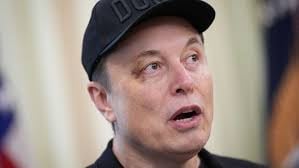
Trump also let Robert Kennedy Jr. loose on the world, endangering the children you love.
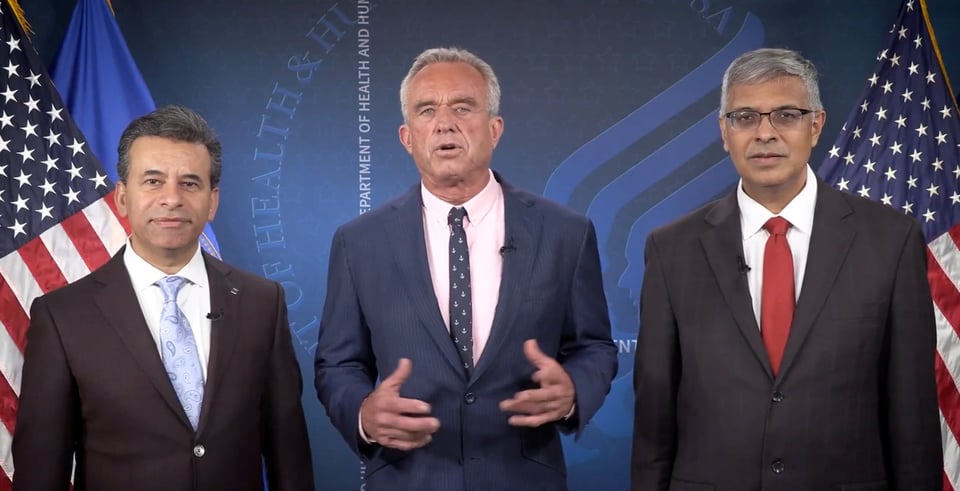
Health and Human Services Secretary Robert F. Kennedy Jr., standing next to Food and Drug Administration Commissioner Marty Makary and National Institutes of Health Director Jay Bhattacharya, seen in a post on X where he announced the removal of the COVID-19 vaccine from the Centers for Disease Control and Prevention's immunization schedule for healthy children and pregnant women.
Earlier this week, Health and Human Services Secretary Robert F. Kennedy Jr. announced in a video posted on X that the Centers for Disease Control and Prevention would no longer be recommending COVID-19 vaccines for "healthy children and pregnant people."
In the video, Food and Drug Administration Commissioner Dr. Marty Makary said there is no evidence that healthy children "need" the vaccine. National Institutes of Health Director Jay Bhattacharya also appeared in the video.
Public health experts said they were surprised by the way the decision was announced.
"The risks are real of COVID but, in general, for an otherwise healthy kid, the bad stuff is thankfully on the low side," Dr. Gregory Poland, a vaccinologist and president and co-director of the Atria Research Institute, which focuses on disease prevention, told ABC News.
"But you have to keep remembering that the risks of the vaccine are lower still," he continued. "You can get the vaccine and get infected, but your infection will be much less severe, or you cannot get the vaccine and get infected and have far higher rates of illness and complications and even a risk of death."
Risks of COVID in children
The current COVID-19 vaccine, the updated 2024-25 shot, was until recently recommended for all Americans ages 6 months and older.
While those with one or more underlying conditions are at higher risk of severe COVD, anybody who becomes infected with the virus can be hospitalized, develop severe disease and die.
When the CDC's Advisory Committee for Immunization Practices (ACIP), which provides advice and guidance on the control of vaccine-preventable diseases, presented data at its last meeting, it "showed that 152 children died last year of COVID. 40% of those children were perfectly healthy," Dr. Paul Offit, director of the Vaccine Education Center at Children's Hospital of Philadelphia, told ABC News.
"So when [Kennedy] says he's not recommending the vaccine for healthy children, that flies in the face of data," he added.
Offit explained that usually it's the ACIP that discusses if there is a benefit to a yearly vaccine and who should get it. The independent advisory committee then makes recommendations to the CDC, which has the final say on who should get what vaccine.
That's not the way this played out. You basically had three men standing up in a little Twitter event making this declaration … without any input from the public, without any input from experts, just these three people, specifically RFK Jr. at the center," Offit said.
There is also a risk of long-term side effects even in otherwise healthy children, according to experts.
As of 2023, more than 1 million U.S. children may have been affected by long COVID at some point, a CDC study published in February found.
At the time the survey was being conducted, approximately 293,000 children were experiencing the condition.
"About a million U.S. kids, it's estimated, have [had] long COVID," Poland said. "If you get the vaccine, you can reduce that risk. Getting the vaccine decreases ER visits and hospitalization by about 40%."
A CDC-led study, published in February found that COVID mRNA vaccination lowered the risk of having at least one or two long COVID symptoms in children ages 5 to 17.
Poland and Offit said there is also a community benefit from being vaccinated. When otherwise healthy children are vaccinated, it protects vulnerable members of the community from infection.
Although immunity wanes, COVID-19 vaccines do, at least temporarily, provide some protection against transmission.
"I would say the primary benefit is to the actual child who gets immunized. There's a secondary, but admittedly transient, benefit to the community," Poland said. "The protection against transmission is short-lived. It's there for a period of time. It's there, but it's transient. But when you do it across a community, you get added benefits."
Questions remain on new policy
Offit said it's unclear if Kennedy's announcement means the CDC will no longer recommend COVID vaccines to healthy children who are previously vaccinated or up to date on vaccines or if the announcement applies to all children regardless of vaccination status.
"I assume what he's saying is that otherwise healthy children who have been fully vaccinated don't necessarily benefit from a yearly vaccine," Offit said. "If that's what he means, that's what he should say. He didn't say yearly dosing. He said 'healthy children.'"
Federal health officials also did not elaborate on what "healthy" children means, which the experts said is bound to lead to some confusion.
Poland said this is because Kennedy has made previous public comments on the growing rate of chronic disease in children, which could mean that he considers many children "unhealthy."
For example, in the White House's Make America Healthy Again Commission report on chronic disease, which was published last week, it cited an unnamed study that allegedly found 77% of young Americans are ineligible for military service due to chronic conditions.
"That's saying, in effect, that 77% of the U.S. childhood population is not healthy," Poland said. (ABC News)
Good news. The CDC undid Kennedy’s ruling on children.
CDC adjusts COVID vaccine guidance, but keeps on child schedule.
The Centers for Disease Control and Prevention has issued updated advice on the COVID-19 vaccine days after Health and Human Services Secretary Robert F. Kennedy Jr said the agency would no longer recommend the shot to children and pregnant women.
The agency has kept the shot on its vaccine schedule for children between the ages of 6 months to 17 years of age, despite Kennedy saying they would no longer be recommended.
The CDC says children with no underlying health condition “may receive” COVID-19 vaccines, instead of broadly recommending that all children should get the inoculation. It now advises “shared clinical decision-making” between parents and physicians.
“Where the parent presents with a desire for their child to be vaccinated, children 6 months and older may receive COVID-19 vaccination, informed by the clinical judgment of a healthcare provider and personal preference and circumstances,” the guidelines now say.
The changes to the CDC’s recommendations for children mean that health insurance companies are still ostensibly required to cover the shot, at least for now.
The CDC’s website also continues to host pages of guidance recommending that pregnant women continue to receive the COVID-19 vaccine because of the higher risk they have of developing serious illness from the disease.
“Studies including hundreds of thousands of people around the world show that COVID-19 vaccination before and during pregnancy is safe, effective, and beneficial to both the pregnant woman and the baby,” the website states.
It’s unclear how COVID-19 vaccine guidelines will change for pregnant women. The CDC’s stance on COVID-19 vaccines during pregnancy is now “no guidance,” per a memo released from the agency Friday, according to The New York Times. The vaccine was previously recommended for all pregnant people.
The Department of Health and Human Services has yet to respond to questions about the new guidelines from The Hill.(The Hill)
You may have heard about this. Senator Joni Ernst of Iowa, up for re-election, did herself no good.
At her town hall, when the crowd says people will die due to Medicaid and SNAP cuts, Joni Ernst responds "well we all are going to die." #iasen pic.twitter.com/2zV7LplIqc
— danny (@dabbs346) May 30, 2025
You may have heard of Zach Wahls, Iowa State Senator. He was raised by 2 lesbian mothers.
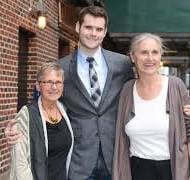
On January 31, 2011, when he was 20 years old, Wahls addressed the Iowa House Judiciary Committee in a public hearing on a proposed constitutional amendment to ban gay marriage in Iowa.
Touch to watch Zach.
BREAKING: Iowa Democrat Zach Wahls just destroyed Joni Ernst for saying "we're all going to die" in response to a question about massive cuts to Medicaid. This is perfect. pic.twitter.com/HnjJLhw78J
— Democratic Wins Media (@DemocraticWins) May 30, 2025
Wahls has hinted he may run against Ernst. Stay tuned.
For your pleasure and edification.
Remember - Use your time well!
Abraham Verghese is a doctor and novelist, and a very wise and good man. He was the Commencement Speaker at Harvard on Thursday.
Have a good weekend, ideally Trump free. See you on Tuesday.